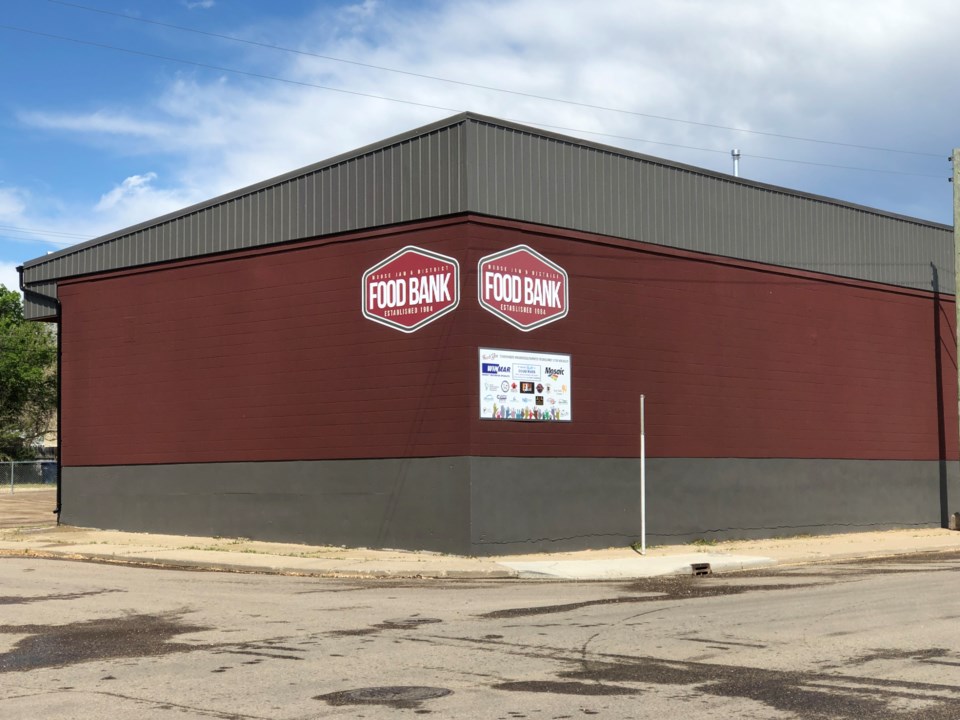MOOSE JAW — After months of planning, the food bank — in partnership with the Co-op — is preparing to launch a new program that transforms residents’ shopping experiences and gives them more self-respect.
The Moose Jaw and District Food Bank and Moose Jaw Co-op announced recently that “The Harvest Pantry” officially kicks off on Monday, Oct. 28, with clients able to shop the next day.
“We are so excited about this. This is something we have been in talks about (for several months). And we have always really appreciated everything the Co-op has done for us over the years … ,” said Jason Moore, the food bank’s executive director. “And now this is wonderful (and) mind-blowing. We are so excited (and) extremely grateful.”
The food bank is thrilled to grow in this new direction, especially since it has seen more people use its services and concerns have arisen about sustainability, he continued.
This new shopping program lets clients choose the food they want, transforms how the organizations deliver food assistance in the community and offers a more dignified and personalized experience for families, the agency said.
The food bank has designed The Harvest Pantry program to give clients opportunities to select food that aligns with their dietary preferences, cultural needs and household situations and promotes autonomy and self-respect.
The Co-op has worked with the food bank for decades but is deepening that support by providing a three-year, $90,000 sponsorship to help the latter transition to this new food delivery model.
“We know as a community that there are currently a lot of people struggling with food insecurity (and) the need and demand are prevalent and stronger than ever,” said Michaela Turner, the Co-op’s community engagement manager. “So this partnership over the three years really evokes a sense of abundance and gathering … .”
With the new program’s name, “harvest” refers to Moose Jaw’s agricultural roots and the gathering of resources for everyone, while “pantry” is a welcoming, dignified place for the community, she added.
The Co-op’s three-year commitment “is a breath of fresh air” for Moore, considering he started in the executive director role in May and faced a food shortage crisis in the summer. This prompted an emergency call to the community for support and a review to remain solvent in the face of a doubling of clients.
The grocery store’s financial support will enable the food bank to continue purchasing food so it hopefully doesn’t face similar problems in the future, he added.
The Co-op holds several annual fundraisers to support the Co-op — such as the Good Buy to Hunger campaign — while it donated $10,000 in emergency funding this summer during the crisis, said Turner. The organization also challenged other grocery stores to make similar donations, but, apparently, none stepped up.
“We just think it’s very important to help those in need when they need a hand up,” she added. “And calling it something different and having a different approach — a unique approach — of people receiving the help, we think is going to have a lot of success.”
The introduction of this client-choice shopping program means the former food hampers are now “a thing of the past,” Moore said. However, that’s OK since it lets clients choose what they want, which can reduce food waste.
Moore pointed out that the Medicine Hat, Alta., food bank changed to this model and reduced food waste by 30 pounds per person annually, with an overall annual decrease of roughly 50,000 pounds. That tour made him realize how much Moose Jaw was wasting.
The food bank here has many newcomers who use its services but don’t know how to use the food they’re given, so they may set it aside or toss it. Therefore, this new model may change that.
Moore added that the organization has had positive feedback from clients who are excited about this new change, while he has heard only good things from Regina’s food bank after it made a similar adjustment.




